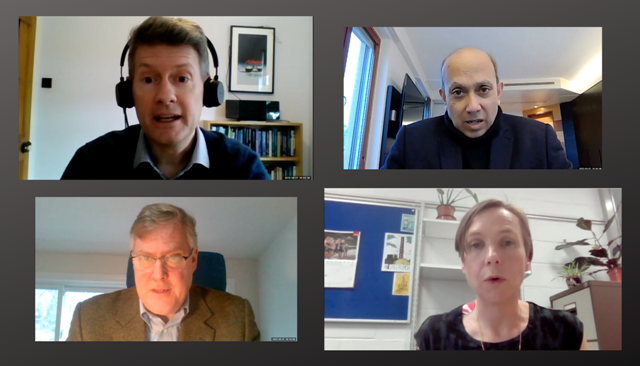 [clockwise l-r:] Peter Clegg, Venkat Iyer, Kate Matheson and Peter Jones.
[clockwise l-r:] Peter Clegg, Venkat Iyer, Kate Matheson and Peter Jones.
On 7 April The Round Table held an event to launch a special section of the February issue, entitled ‘Falkland Islands: 40 years on’ (Volume 11, Issue 1). The aim of the special section (co-edited by Kate Matheson and Peter Clegg) was not only to remember the events of the Falklands War but also to recognise what has changed since then – politically, diplomatically, economically, and socially.
The launch began with a welcome from Venkat Iyer, the editor of the journal. Then an overview was given of the papers that were not specifically featured in the launch. In his paper Matthieu Grandpierron interrogates the diversionary theory of war and identifies its limitations as it applies to the Falklands War. Grace Livingstone considers how important a role oil has played in British policy towards the Islands and in the Falklands itself. Falkland Islanders Michael Betts, Jan Cheek and Nikki Wilks, and academics Catriona Pennell, Alasdair Pinkerton and Matthew Benwell reflect on memory and the act of remembrance. Two shorter pieces are also featured in the special section: Tom Herring on the work of the South Atlantic Medal Association and Rogério do Nascimento Carvalho on how the possibilities of greater mineral extraction around the Falklands is sharpening Argentina’s diplomatic activity.
After setting the scene the launch turned to the three featured papers. Peter Jones discussed his article, ‘Time to talk? Track two diplomacy and the Falklands/Malvinas dispute’. He spoke about whether a dialogue is possible between influential, but unofficial, Argentinians, Britons and crucially Falkland Islanders over the future of the Islands. He stated that Track Two is not a panacea but has allowed progress to be made in some intractable disputes. Next, Kate Matheson discussed her article, ‘Resilience and Social Control: How the Falkland Islands handled the Covid-19 pandemic’. She spoke about the concept of ‘Quarantine Islands’ and Falkland Islanders’ capacity to anticipate disaster, work collaboratively, and act as a single community. Kate also considered the initiatives that the Falklands have implemented to mitigate the impacts of Covid. Thirdly, Peter Clegg presented the key findings from his article ‘Political and constitutional issues for the contemporary Falkland Islands’. He discussed the generally positive constitutional relationship between the Falklands and the UK and the slightly more difficult political relations. One key discussion point was the view of the Falklands that direct representation in the Westminster Parliament is not a good idea. Peter then concluded by considering the idiosyncratic political system of the Falklands itself.
The penultimate part of the launch featured a Q&A. Questions were asked about whether Track Two could be applied successfully to the Falklands, with a small population of about 3,500 people. Peter Jones thought it could, as Track Two generally involves a small group of people from the various sides who are perhaps sceptical about a way forward, but who are prepared to meet and discuss. However, he recognised that Track Two has not been used for very small countries. There was also a question on the nature of ‘surveillance’ in the Falklands as a mechanism to limit the spread and impact of Covid-19. Rather than having a negative meaning, Kate Matheson argued that it highlights the fact that Islanders know each other well and can offer some useful boundaries when it comes to the upholding of public health standards. Also, there was an exchange on the much changed demography of the Falklands and the wide range of nationalities that are present, over 60 at the last count.
The launch was joined by Teslyn Barkman, a member of the Falkland Islands Legislative Assembly. She stressed the growing and maturing voice of Falkland Islanders. She also noted how the Islanders’ political voice has been “elevated”, but frustratingly is still not always recognised on the international stage. She was hopeful that the next generation of Islanders would not have to deal with the same struggles to justify the existence of the people of the Falklands to the world. She made clear that the international community should recognise the rights of the Islanders and not just have “a conversation about who owns some rocks in the South Atlantic”. On this point more work was needed in the UK and elsewhere so that Islanders are not removed from the conversation. Teslyn talked about “looking forward at 40” and being able to think about “normal things”.
To conclude the launch, several questions were asked of Teslyn, as a representative of the Falkland Islanders. First, could the Falklands survive on their own without the UK? In an ideal world Teslyn felt they could, but with the difficult geo-political situation, “we would not succeed without the support of the UK Government and UK people”. Secondly, there was a question about the quality of the relationship between the Falklands and UK. Teslyn believed it was “strong”, but work was needed to maintain that strength, in particular, to reinforce the mutually beneficial aspects of the relationship and to counter any misrepresentations, such as the suggestion that the Falklands does not pay its way. Lastly, Teslyn was asked to describe the Falklands today. She noted the importance of environmental sustainability, that the people were proud, positive and united, and that there was an appreciation of the “great freedoms that we have been able to enjoy”.
Peter Clegg is Professor of Politics and Head of the Department of Social Sciences at the University of the West of England, Bristol and a member of the Round Table Editorial Board.
Related articles and audio:
Special edition introduction: Falkland Islands – 40 years on
Click here to listen to the full event
Listen to highlights from the discussion:
Peter Jones on the Track Two process and small countries
Peter Clegg on possible representation for the Falklands in the UK Parliament
Teslyn Barkman on the importance of the Islanders’ voice
Teslyn Barkman on being part of the UK family



